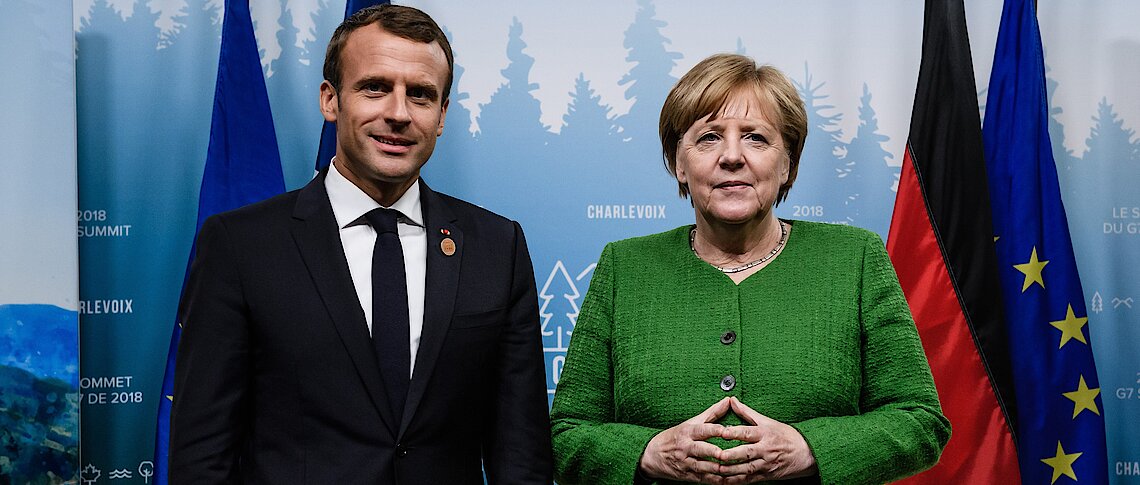Read this article in German.
The German chancellor needed more than nine months to provide an answer to French president Emmanuel Macron’s speech to the Sorbonne last September. It finally came in the beginning of June, when Angela Merkel granted the Frankfurter Allgemeine Sonntagszeitung an interview to elucidate her plans for Europe.
If there were scores handed out for dramatic effect, Merkel would get top marks. She has allowed Europe to wait so long for her answer to Macron that her partially concrete agenda is being widely celebrated.
The mere fact she is expressing her views on European politics is being feted as if she were the Oracle at Delphi. And Merkel has picked the right moment. Her insistent call that Europe must take its destiny in its own hands – in light of Donald Trump’s imposed punitive tariffs and fears of a return of financial crisis in Italy – has resonated with even the most narrow-minded backbencher in her party.
However, the chancellor delivered a somewhat stubborn interpretation of the European chapter of the coalition agreement. Yes, she defended the German coalition’s plans for a common European asylum and border policy, as well as further moves in terms of European foreign and security policy. Yes, she stood by her confirmation of higher payments by Germany into the EU budget. But on the burning issue of eurozone reform, she held firm to the orthodox liberal line she struck at the outset of the crisis eight years ago.
Every state for itself
As such, the conversion of the European Stabilisation Mechanism (ESM) into a European Monetary Fund (EMF) should be accompanied by a strictly conditioned lending process, the possibility of state debt restructuring and an observer role for the European Commission. Behind it, unashamedly, is the demand for the reinstatement of an old no-bailout clause in the EU treaty, which was adapted by the rescue funds in the eurozone crisis.
This would mean that, even in difficult liquidity crises, every state has to look after itself – a concept jettisoned during the eurozone crisis because of the dangers of contagion. What’s more, a threatening insolvency procedure for overly indebted states would, with nervous market players, quickly become a self-fulfilling prophecy – monetary union would no longer be able to find a way back to stability.
We need a common insurance mechanism to cushion economic downturns, as has been successfully practised at the national level for a long time – for example, via unemployment insurance.
For the social democrats (SPD), Merkel's coalition partner, that is not acceptable, because the main system for overcoming crises is being buried. The negative experiences of adjustment programmes acting in a procyclical manner, which have exacerbated the economic crisis in southern Europe, should have made the impotence of the austerity policy clear. The chancellor highlighted rules, obligations, restrictions and repayments in the interview as if there had been no rise to government of left- and right-wing populists in countries such as Greece or Italy thanks to Merkel’s rigid euro policy.
Reheated ideas
The proposals for the reform of monetary union tabled according to the demands of both Macron and the European Commission are miles away from this. The supposedly generous counterproposal by the chancellor – a new line of short-term credit in the future EMF – changes nothing in this respect.
No state would willingly take it on if the consequences are debt restructuring and the takeover of national economic policy by the new fund, similar to what happened with the Troika under the ESM. What’s especially brash is Merkel’s interpretation of the investment budget for the eurozone envisaged in the coalition agreement. It was to be expected that she would not support the French president’s ideas for a common budget for the eurozone.
But Merkel is only reheating the idea that she came up with in 2013, of an instrument that rewards pro-competition structural reforms. The idea: member states that virtuously fulfil the usual demands for flexible labour markets, low sector-specific wages, low minimum wages and privatised retirement provisions will receive recognition from a common pot ‘at the lower end of double-digit billions’.
The Commission saw itself as obliged by Germany to set out a draft instrument for convergence and competitiveness, which fell by the wayside after it was widely rejected by the other member states. This amounts to wishing for its reincarnation under the misleading label of ‘investment budget’. It is now up to the social democrats to explain to their coalition partner that the purpose of the investment budget cannot be the completion of disciplinary measures for structural reforms; instead it must be the move to an urgently needed automatic stabiliser for economic crises.
Susceptible to shocks
The euro crisis showed how susceptible eurozone countries are to asymmetric shocks, which cannot be remedied either by a common monetary policy or by an economic model imposed on all member states regardless of their economic cycles. For this, we need a common insurance mechanism to cushion economic downturns, as has been successfully practised at the national level for a long time – for example, via unemployment insurance.
It would be negligent to leave the interpretation of the European chapter of the coalition agreement to the conservatives alone. If the SPD further expands its already-tabled counterproposal for EU reform in the coming weeks, the lasting ability of the eurozone to withstand crises and a social Europe should be to the fore, not market discipline and competition-driven harmonisation.
On the last point, only the supply-side fight against high youth unemployment occurred to Merkel in the celebrated interview. This will not suffice to kickstart the Franco-German motor, nor to reconcile Italian voters with Europe.






